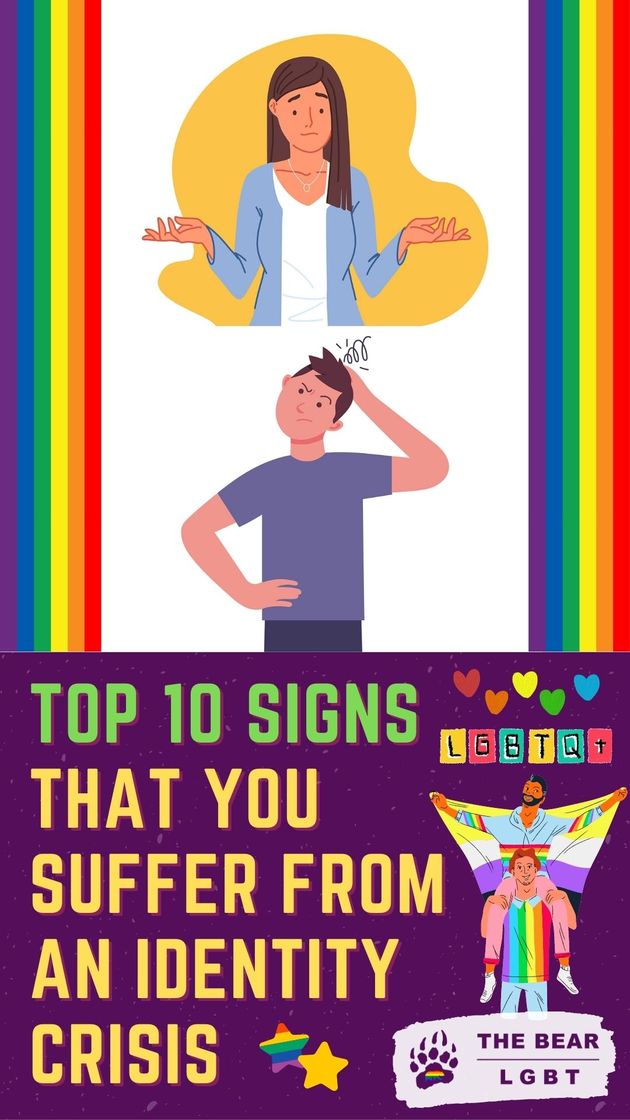
Top 10 Signs that You Suffer from Identity Crisis While in Thailand
If you've been listening to the term identity crisis lately and wonder if it interprets you, you're perhaps not alone. What does it mean? 🧐 If you think that the gender you were assigned at birth doesn’t match the gender you identify with, then you may have a connection to this topic, especially while you're in Thailand.
How to know if someone suffers from an identity crisis? Losing a job or a loved one, having to relocate to another country and leaving family behind, can all leave us feeling empty and disconnected from our sense of self temporarily 🤔 But an actual identity crisis means we don’t improve a solid identity as an adolescent. People who face this crisis may have an extent of feelings and attitudes that show distress or anxiety. The level of distress can be severe and influence all areas of their life.
Here are some denoting signs that you’re possessing an identity crisis, along with my best advice for overcoming this stage 🙋♀️ If you lack a sense of identity, check for these 10 components that show you might not have a strong sense of self.
🏳️🌈 Fact!
An identity crisis can begin at a young age, as early as three years old, with a maximum around puberty as secondary sex elements develop. But not everybody who fits into an identity crisis will have the experience so early in life.
How to Recognize the Signs of an Identity Crisis?
Our identity is the way we interpret ourselves 🙋♀️ This comprises our values, our beliefs, and our personality. It also incorporates the roles we play in our society and family. Our memories, our expectations for the future, as well as our hobbies.
In order to possess a strong identity, how should one's character be reflected? It is imperative to see ourselves as consistent and unchanging individuals over time, regardless of external circumstances 🤔 While we may exhibit different behaviors and emotions in various situations, such as being moody or acting differently around different people, we maintain a sense of core identity underneath it all.
Essentially, a strong identity entails acknowledging that we remain the same person over time, despite any changes in our attitudes or behaviors.
How Can We Understand the Possible Causes of Identity Crisis?
 An individual lacking a sense of self or personal identity can instead feel disconnected from who they have been or have no sense of who they will become next 🙋♀️ They feel like a unique person sometimes from day to day. Some report it as looking in the mirror and discovering it hard to believe it is them looking back. An identity crisis is not associated with your personality. You are not born with an unstable personality.
An individual lacking a sense of self or personal identity can instead feel disconnected from who they have been or have no sense of who they will become next 🙋♀️ They feel like a unique person sometimes from day to day. Some report it as looking in the mirror and discovering it hard to believe it is them looking back. An identity crisis is not associated with your personality. You are not born with an unstable personality.
An identity crisis is guessed to improve because the atmospheres you grow up in don’t give you the help you need. Moreover, it can be apodictic in varied types of behaviour 🧐 Some people may cross-dress, and some may want to socially transition. In contrast, others may prefer to medically transition via hormone therapy and/or sex-change surgery.
🏳️🌈 Trivia
An identity crisis is not the same as specifying a varied gender or sexual orientation, such as gay or bisexual. Nor is it the same as gender dissents, such as girls functioning and dressing in ways more socially predicted of boys or adult men who sometimes cross-dress.
Top 10 Notable Signs of An Identity Crisis
Experiencing an identity crisis can lead to feelings of frustration, being stagnant, or requiring substantial change 🧐 It can also affect a person's emotional state, leading to feelings of depression or anxiety and an overall sense of dissatisfaction with their life and themselves.
However, unlike other mental health issues, an identity crisis can be more challenging to recognize because the experience is often vague. To help identify an identity crisis, here are the top 10 common signs to look out for:
#10 Relationships Shape You
Are you referring to individuals who feel lost without a romantic relationship and tend to change their hobbies and appearance to match their partner's interests? 🤔 Sometimes, they convince themselves that their partner's preferences are their own, even if it involves a complete shift in their music taste or wardrobe. In some cases, they may even give up their friendships to accommodate their partner's preferences 🙋♀️
It can be easier to mold oneself to fit their partner's expectations rather than confront their identity crisis. These individuals may experience a constant feeling of dissatisfaction with everything in their life. To overcome this, it is essential to focus on the positive aspects of one's life and strive to shape it into what one wants it to be 🧐 In order to create the life you truly desire; it is crucial to release the past and concentrate on the present moment. You can achieve this by taking small steps every day toward your goals.
#9 You’re Debating & Not Taking Action
This can contain big things like political and religious beliefs, your viewpoint on prominent culture, and food and fashion. You might even discover you change your mind daily and never know what you’ll agree with next 🤔 Whether you understand it or not, you will change your impression to please others and find approval. Even if you are thinking differently with someone, on a certain level, you establish they like a challenge, so attending an opinion lets for debate.
When you realize that you're spending more time pondering your identity and what actions to take to improve your personal and professional life, it's a sign that you need to shift your mindset. Do your research 🙋♀️ Speak to friends, family members, a trusted educator, and industry professionals about your intentions and feelings. Having a mentor or coach can be valuable in guiding you forward with their advice, as learning more can increase your willingness to take action toward your goals.
#8 You Don't Like Being Asked About Yourself
 It makes you anxious when people ask too many questions about you 🧐 Maybe you have evolved good tactics for preventing this, like shifting the subject or turning questions around onto the other person, then just agreeing with them.
It makes you anxious when people ask too many questions about you 🧐 Maybe you have evolved good tactics for preventing this, like shifting the subject or turning questions around onto the other person, then just agreeing with them.
Feeling like you are going through the motions without a sense of purpose or direction can be disheartening. Don’t despair. Take this chance to slow down and face the people who ask about you 🧐 Reassess your hopes, and correct your course. Developing mindfulness and self-confidence can help you connect with your real ambitions and comfortably face social difficulties.
#7 You’ve Lost Your Purpose
If you are experiencing doubts about your values, your life path, or your identity in response to the question "Who am I?" you may be struggling with an identity crisis 🙋♀️
You feel like there is no objection to your life or there is a bigger goal than what your day-to-day life currently offers. The competition to find a purpose can be low spiraling in itself. Begin volunteering and concentrating on making a difference to other people outside your formal sphere of significance 🤔 Start making a variation for new people and shift the focus to you.
#6 Your Plans Aren’t Working Anymore
 A telltale sign you’re suffering an identity crisis is that your plans don’t work anymore. Everything you’ve created for yourself, your job, your regular routine, now feels passive, even suppressing 🙋♀️ When this goes on, be kind to yourself. Give yourself the approval to change tracks and get interested in what will serve you best at this stage of life.
A telltale sign you’re suffering an identity crisis is that your plans don’t work anymore. Everything you’ve created for yourself, your job, your regular routine, now feels passive, even suppressing 🙋♀️ When this goes on, be kind to yourself. Give yourself the approval to change tracks and get interested in what will serve you best at this stage of life.
🏳️🌈 Question
Are adolescents tend to be more prone to an identity crisis?
#5 Making Big Changes That Aren’t ‘You’
Engaging in life changes that are out of character may indicate an identity crisis, but this doesn't have to be negative. It can serve as an opportunity for reflection, re-evaluation, and positive growth 🧐 Working with a mentor or coach can be particularly helpful during this time, as they can provide objective feedback and support your progress without any personal agenda.
#4 Your Relationships Don't Run Deep
When experiencing an identity crisis, it is common to fear that others may realize you are uncertain about who you are and, as a result, not accept you 🙋♀️ This can lead to self-protection and jealousy, making it challenging to form genuine connections with others, despite having many acquaintances or being in a relationship.
Additionally, you may struggle to maintain long-term relationships or find yourself surrounded by people who influence your decisions. If you find yourself spending more time analyzing the past of others than planning for your future, it is essential to remember that everyone's accomplishments are based on different opportunities and choices 🧐 Rather than dwelling on someone else's path, focusing on creating your own is essential.
#3 Everything Feels Like A Chore 
At a particular stage of life, we may become known for our particular strengths and abilities, which others rely on us to fulfill. This can become a habitual pattern that we have always been rewarded for. Why the crisis? 🙋♀️ We are missing the enthusiasm. When you have a desire that crosses with strength but lacks excitement, it is called a “chore.” Focus on discovering your lovely place where passion, power, and need are extended.
#2 You Get Bored Easily
Not having a strong sense of identity can cause a sense of unease and fear of committing to something that may be detrimental instead of beneficial 🤔 The desire to understand oneself is often accompanied by the fear of what that understanding may reveal.
When life and work aren’t working actively, check in with your strengths and importance. Frequently that feeling of “Is this all there is?” arises when we drift off-center 🙋♀️ You may be profitable but not delighted and get bored, and that could demonstrate it’s time for a change. Get quiet and verify your strengths. You should be asking yourself, “What am I good at?” and try reconnecting with your values: “What do I care about?” Then, at any identity, begin again 🤔
#1 Deep Down, You Don't Trust Yourself
When you have a history of making impulsive decisions and changing your opinions frequently, trusting yourself and establishing a sense of identity can be challenging 🤔 Moreover, feeling restless can be a sign that you are no longer satisfied with your current situation or job, even if you excel at it.
You may feel uncertain about how your skills and accomplishments align with your long-term goals. In such cases, it's crucial to take a step back, reflect on the times when you had more clarity, and identify how you lost it 🙋♀️ Once you understand what caused the shift, you can create a plan to get back on track toward achieving your desired outcomes.
🏳️🌈 Did you know?
Dealing with an identity crisis involves reflecting on oneself and engaging in self-exploration without any internal or external criticism.
Public awareness and understanding of identity crisis are crucial to prevent adding considerable external stress to the internal pressure the person is bound to be undergoing already 🙋♀️ Because the identity crisis involves people in many different ways, treatment selections also vary. If you think you might have an identity crisis, help is out there. I recommend seeking out a local LGBTQ+ community assistance group, a psychotherapist, a counselor, or a good friend. 🧐
Jamie (Curious Bear)
More From The Bear LGBT
Is Bullying of Gay Youth Still Pervasive in Thai Schools?
Gabriel (Gay Bear)



















